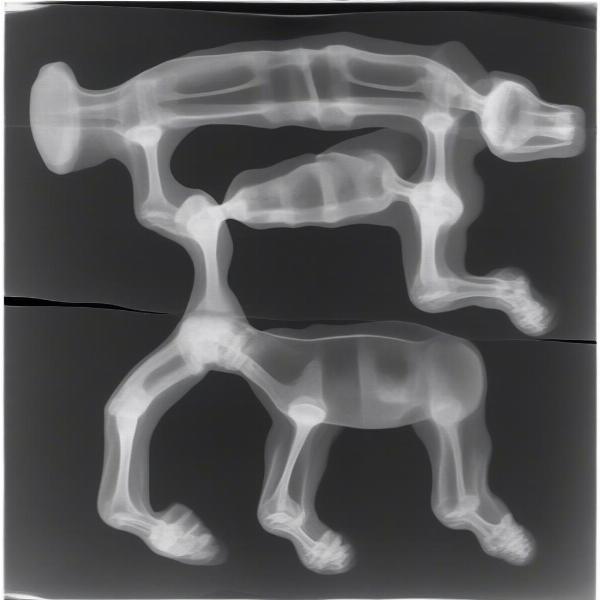The search term “screw with dog point” likely refers to a dog’s tail, specifically what is sometimes called a “screw tail” or “corkscrew tail”. This unique tail shape, often curled tightly like a pig’s tail or forming a tight spiral, can be a breed characteristic or, in some cases, indicate an underlying health concern. This article will delve into the various aspects of screw tails in dogs, covering breed-specific traits, potential health implications, and overall care considerations.
Breed Standards and the Screw Tail
Many breeds are known for their naturally occurring screw tails. This characteristic is often a defining feature in breed standards, contributing to their unique appearance. Breeds like Pugs, French Bulldogs, Boston Terriers, and English Bulldogs commonly exhibit this tail type. It’s important to understand that in these breeds, a screw tail is considered normal and desirable, not a defect.
Potential Health Issues Related to Screw Tails
While a screw tail is often a harmless breed characteristic, in some cases, it can be associated with health problems. One such concern is hemivertebrae, a congenital spinal deformity. This condition affects the vertebrae, causing them to be wedge-shaped, potentially leading to spinal curvature and neurological issues. Hemivertebrae can occur in dogs with screw tails, especially Bulldogs, French Bulldogs, and Pugs.
 Hemivertebrae in Dogs
Hemivertebrae in Dogs
Identifying and Managing Hemivertebrae
If you suspect your dog might have hemivertebrae, consult a veterinarian. They can diagnose the condition through physical examination and imaging techniques like X-rays or CT scans. Treatment options depend on the severity of the condition and can range from pain management and physical therapy to surgery in severe cases.
Caring for a Dog with a Screw Tail
Whether your dog’s screw tail is a breed trait or related to a health issue, proper care is essential. Keep the area around the tail clean and dry to prevent skin infections. Regular grooming and checking for any signs of irritation or injury are crucial. If you notice any redness, swelling, or discharge, consult your veterinarian.
When to Consult a Veterinarian
Any sudden change in your dog’s tail, such as increased curvature, pain, or difficulty moving the tail, warrants a veterinary visit. Early diagnosis and intervention can significantly improve outcomes, especially in cases involving hemivertebrae.
Conclusion
“Screw tail” in dogs can refer to a breed-specific trait or a potential health concern. Understanding the difference is vital for responsible dog ownership. By being informed about breed standards, potential health issues, and proper care, you can ensure the well-being of your canine companion. Regular veterinary checkups and prompt attention to any changes in your dog’s tail are essential for maintaining their health and happiness.
FAQs
- Is a screw tail always a sign of a health problem? No, many breeds have naturally occurring screw tails as part of their breed standard.
- What is hemivertebrae? Hemivertebrae is a congenital spinal deformity where the vertebrae are wedge-shaped, potentially causing spinal curvature and neurological problems.
- How is hemivertebrae diagnosed? A veterinarian can diagnose hemivertebrae through a physical examination and imaging techniques like X-rays or CT scans.
- How is hemivertebrae treated? Treatment options vary depending on the severity and can include pain management, physical therapy, or surgery.
- How do I care for a dog with a screw tail? Keep the area clean and dry, groom regularly, and check for any signs of irritation or injury.
- When should I consult a vet about my dog’s screw tail? Consult a vet if you notice any sudden changes in tail curvature, pain, or difficulty moving the tail.
- Which breeds commonly have screw tails? Pugs, French Bulldogs, Boston Terriers, and English Bulldogs often have screw tails.
ILM Dog is your trusted resource for comprehensive dog care information. We offer expert advice on various aspects of dog ownership, from breed selection to health care, training, nutrition, grooming, and more. For professional guidance and personalized support for your canine companion, contact ILM Dog at [email protected] or call +44 20-3965-8624. Visit us at ILM Dog to learn more.